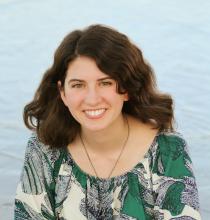Under the guidance of Dr. Scharf, I currently study the ear bones, or otoliths, of red drum fish. Each otolith has rings on it, and by counting the banding, I can figure out how old the fish is. This process is similar to counting tree rings, and each band represents one daily cycle. I observe the rings under a scanning electron microscope and measure the width of each band. In addition to its date of birth, I am also trying to find out the fish’s relative growth rate. If a ring on the otolith is larger than the others, then the fish grew at a faster rate on that day. Ultimately, my research seeks to find patterns in red drum growth rate during early life development.
Through applied learning, I hoped to gain practical application for the concepts that I learned in lectures, so I sought out a Directed Individual Study (DIS) with Dr. Kamel’s lab and conducted DNA analysis of barnacles. I learned a variety of research techniques and obtained a better understanding of molecular biology. But through that experience, I discovered that genetics is not a topic I’m passionate about. Because I enjoy learning about macro-organisms, I pursued a DIS with a fisheries professor. I currently work with Dr. Scharf, and during my first semester in his lab, I helped his graduate students with their research by collecting data and prepping samples. Now, I have my own project that will culminate into my Honors Thesis.
By engaging in applied learning, I’m always improving my communication and problem-solving skills. I've learned how to confidently work independently, and I will admit that working with otoliths is sometimes tiresome because I need to repeat the same methods for each and every single one. But ultimately, this experience is allowing me to finally contribute to scientific research in a real, meaningful way.
Through these experiences, I have gained invaluable skills that will seperate me from other candidates such as data collection, sample preparation, and scientific diving. I am also connected to professors and graduate students that are researching the same topics that I want to pursue in my future studies.





